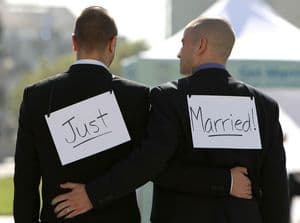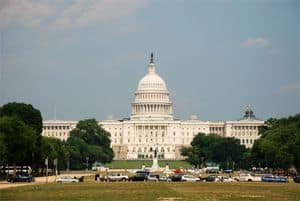 The upcoming Supreme Court decisions on DOMA and Prop 8 will not be the last word on marriage, in particular, or gay rights, in general. As we look forward to those words, however, let's take a look ahead and discuss how the legal landscape may be more complicated after the end of June. "Gay Rights After SCOTUS" is Towleroad's series on LGBT legal issues after Perry and Windsor. In today's column, state-to-state marriage recognition.
The upcoming Supreme Court decisions on DOMA and Prop 8 will not be the last word on marriage, in particular, or gay rights, in general. As we look forward to those words, however, let's take a look ahead and discuss how the legal landscape may be more complicated after the end of June. "Gay Rights After SCOTUS" is Towleroad's series on LGBT legal issues after Perry and Windsor. In today's column, state-to-state marriage recognition.
The Defense of Marriage Act (DOMA) makes things really easy: it mandates that no matter what this or that state says about marriage, gay marriages are never going to be recognized by the federal government. So-called "federal marriage law" — to the extent that there is such a thing — will be a lot more complicated when the Supreme Court tosses DOMA into the dust bin of history.
Complication is not always a bad thing. It just takes a little more work.
Normally, marriage law is pretty simple: For 99 percent of heterosexual couples, the hardest thing about marrying in one state and moving to another state is packing the fine china. Sure, there are some states (New York) that allow first cousins to marry and some states (West Virginia) that do not, but for the most part, when a man marries a woman, they are married in all legal respects whether they live on the 65th floor in an Upper West Side hi-rise or in a ranch house in Oklahoma.
The end of DOMA doubles down the complexity faced by legally married same-sex couples. What is the governing law for marriages for federal law: the place of celebration or the place of domicile? What if the choice of law is different from different aspects of federal law? What happens when a legally married couple moves to a state that feels that their marriage violates public policy? What of gay couples that do not have the option of marrying and are in registered domestic partnerships or civil unions that provide all the benefits of marriage?
It's time to start imagining a world where we have to answer these questions. Join me AFTER THE JUMP as we look forward to a brave new world.
CONTINUED, AFTER THE JUMP…
This column is really about an arcane, complex, and salient concept called "choice of law." If you've ever signed or read almost any kind of contract, there is usually a provision that states, "this contract will be interpreted according to the laws of the State of Smith." That's a choice of law provision; the parties have literally chosen a state's law to govern their relationship with one another.
 Couples seeking to marry can choose law to the extent that they can go somewhere that recognizes gay marriage. By coming to New York City, for example, a Dallas, Texas, couple is choosing New York law to govern their marital relationship.
Couples seeking to marry can choose law to the extent that they can go somewhere that recognizes gay marriage. By coming to New York City, for example, a Dallas, Texas, couple is choosing New York law to govern their marital relationship.
So, in a world without DOMA, which makes the choice of law question moot, what will the federal government do? The general rule is the marriages are recognized in the state of celebration, or the state the couple signed the marriage license, even if they reside somewhere else.
Some people argue that all states should recognize same-sex marriages performed in other states because the Constitution, specifically the Full Faith and Credit Clause, requires the states to recognize the "the public acts, records, and judicial proceedings, of every other state." But a marriage license is not a judicial proceeding and although it could be considered a "record," courts have generally not required other states to give binding recognition under the Full Faith and Credit Clause to similar documents, such as a pharmacist's, dentist's, or a lawyer's license.
That means that the Constitution isn't going to be much help coming up with a clear choice of law rule in a post-DOMA world. We could rely on the common law default rule that marriages are recognized by the federal government based on the laws of the state of celebration. But the common law rule has exceptions — big ones — that make life impossibly difficult for gay couples to move from one state to another when those state gay marriage laws differ. For some moves — say, from New York to New Mexico — there is no problem because whereas New Mexico may not be a freedom to marry state, it will recognize out of state gay marriages. But for other moves — say, from Massachusetts to Utah — the public policy exception to out-of-state marriage recognition takes Utah off the map as a viable destination for gay couples.
This raises questions of social justice and fairness, but also constitutional rights. You have a right to move, and states that ban gay marriage and refuse to recognize out-of-state marriages put an effective burden on gay would-be new residents. In Saenz v. Roe (1999), for example, the Supreme Court held, in part, that those who leave one state and become permanent residents of another state have a right to be treated equally to native born citizens of that state. That holding is not cabined by a mover's sexual orientation: a gay person isn't entitled to be treated like any other gay person in his new state, but rather he is entitled to treated equally to any other person in his new state. That could apply to marriage discrimination, as well.
 Of course, Congress could step in and solve the complexity problem. The Respect for Marriage Act (ROMA), for example, would codify the following rule:
Of course, Congress could step in and solve the complexity problem. The Respect for Marriage Act (ROMA), for example, would codify the following rule:
For the purposes of any Federal law in which marital status is a factor, an individual shall be considered married if that individual's marriage is valid in the State where the marriage was entered into or, in the case of a marriage entered into outside any State, if the marriage is valid in the place where entered into and the marriage could have been entered into in a State.
This is a pretty good rule and a good one for the gay community. The rule would make domestic marriages valid for federal purposes if the marriages were valid in the state of celebration. Notably, that's almost always the case: you go to a state to get married specifically because that state would recognize your marriage as valid. What's more, it has the added benefit of being simple, easy to implement, and plain to understand.
Short of this kind of Congressional action — which, by the way, is unlikely, given the makeup of the House and the long decades that have passed without Congress taking any action to mop up the messy patchwork of choice of law rules when it comes to marriage — the post-DOMA world will be a tangled web of common law rules that will be subject to future litigation. There are no simple answers to the next questions. The IRS may interpret the tax and bankruptcy codes to define marriage based on state of celebration, but that rule can be challenged. Immigration authorities may interpret the rule differently, based on contradictory case law coming out of the spousal visa context, though, as attorney Lavi Soloway has argued, the celebration rule is the stronger argument.
***
Follow me on Twitter: @ariezrawaldman
Ari Ezra Waldman is the Associate Director of the Institute for Information Law and Policy and a professor at New York Law School and is concurrently getting his PhD at Columbia University in New York City. He is a 2002 graduate of Harvard College and a 2005 graduate of Harvard Law School. Ari writes weekly posts on law and various LGBT issues.



